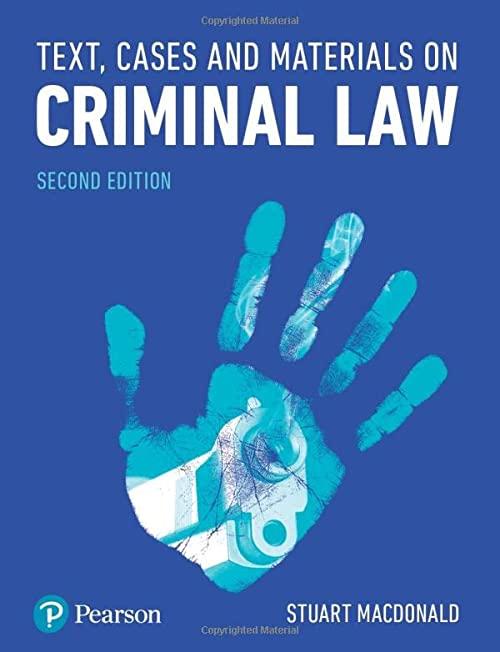Question
Please help! Read through the following examples and determine whether the requirements of a grand jury have been met, whether double jeopardy may apply or
Please help! Read through the following examples and determine whether the requirements of a grand jury have been met, whether double jeopardy may apply or whether the right of self-incrimination has been violated. Please be sure to cite your sources, including specific court cases. Q#1) Thomas Adams is pulled over while driving a vehicle because of suspicion of DUI. After a series of field sobriety tests on the roadside, Mr. Adams is transported to a DUI van for a blood draw. At the van, Mr. Adams refuses to voluntarily submit to the blood draw and eventually the police are required to constrain Mr. Adams. At trial, prosecution introduces evidence of Mr. Adams's refusal to voluntarily submit to the test and evidence of the blood samples drawn. Mr. Adams's attorney, Ms. Kendro, argues that the evidence of the refusal to submit to the blood draw and the blood draw itself are violations of Mr. Adams's right against self-incrimination and moves that the evidence be suppressed as fruit of the poisonous tree. Are Ms. Kendro's two assertions correct? Why or why not?
Q#2) Mr. Lowerson has been arrested by City of Cornville, MN police officers for the suspected molestation of several pubescent girls. During the interrogation, the police utilize lit cigarette butts to burn Mr. Lowerson's legs in order to compel him to confess to the crimes. During pretrial proceedings, Mr. Lowerson's attorney, Ms. Kendro, argues that the confession was not voluntarily given and, therefore, a violation of Mr. Lowerson's 5th Amendment right against self-incrimination and should therefore be suppressed. The judge hearing the motion denies Ms. Kendro's motion. Was the judge's refusal to grant Ms. Kendro's motion correct? Why or why not?
Q#3) John Barrows is arrested after a car he was driving strikes and kills a pedestrian. Mr. Barrows is tried on charges of reckless homicide and driving while intoxicated. Mr. Barrows's attorney, Ms. Kendro, argues that the second trial for driving while intoxicated constitutes double jeopardy, because the crime trials arise out of the alleged impetus of crime. Is Ms. Kendro's assertion that the trial is in violation of her client's right against double jeopardy correct? Why or why not?
Q#4) Susan Smith is convicted of felony murder of a store clerk during an armed robbery. Ms. Smith is then placed on trial by the same jurisdiction for the armed robbery of the store. Ms. Smith's attorney, Ms. Kendro, argues that the second trial for armed robbery cannot occur because it is a violation of Ms. Smith's right against double jeopardy. Is Ms. Kendro's assertion correct? Why or why not?
Q#5) Prosecutors call a grand jury, seeking an indictment for money laundering. Several of the members of the grand jury are active members of the local police department. Is the calling of this grand jury proper because it includes members of local law enforcement?
Step by Step Solution
There are 3 Steps involved in it
Step: 1

Get Instant Access to Expert-Tailored Solutions
See step-by-step solutions with expert insights and AI powered tools for academic success
Step: 2

Step: 3

Ace Your Homework with AI
Get the answers you need in no time with our AI-driven, step-by-step assistance
Get Started


